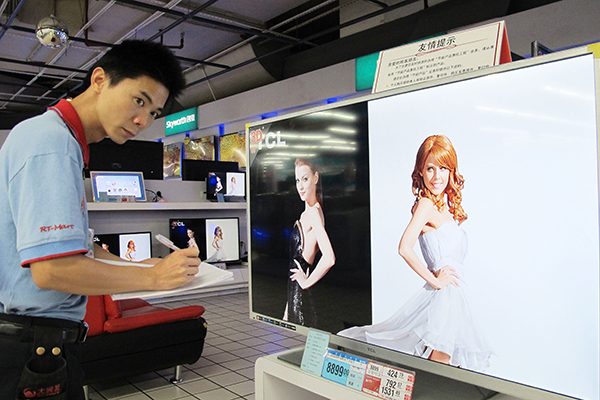 |
|
A TV section at an RT-Mart store in Haikou, Hainan province. China's TV sales revenue slipped to 71 billion yuan ($10.7 billion) in the first half of the year, down 4 percent year-on-year. [Photo/China Daily] |
High-tech focus, overseas expansion are expected to offset a slew of problems at home
Slowdown-scarred, growth-seeking Chinese television manufacturers are shifting their focus to intelligent TVs and overseas markets.
Five key reasons characterize the trend: falling sales, the rise of smartphones and personal computers as viewing devices, overcapacity, high inventory and fiercer competition in the domestic market.
For long, China has been a major base for production and sale of TVs. But sales revenue slipped to 71 billion yuan ($10.7 billion) in the first half of the year, down 4 percent year-on-year, according to All View Cloud, a Beijing-based home appliances consultancy.
One of the factors that caused the revenue fall is TV makers' low-price strategy. The average price of a TV set fell 10.2 percent to 3,020 yuan in the first six months.
The explosion of mobile internet, and the limitless content it offers, have also made the traditional TV almost obsolete. The advent of cloud-computing and big-data technology has given viewers new ways of storing and retrieving content for consumption at their convenience.
Internet companies such as PPTV Media Tech Co Ltd and Baofeng Technology Co have forayed into high-end TV manufacturing, intensifying competition in the domestic market, said Dong Min, general manager of AVC's TV department.
So, Sichuan Changhong Electronic Co Ltd has switched gears and began manufacture of intelligent TVs itself. Its Changhong CHiQ TV model boasts features like interactive voice system and self-learning capability. Users can "communicate" with the TV-and the TV will understand their preferences and adjust itself to beam what they need.
"We're always seeking to enrich living spaces as well as develop the industry with technological advancements and innovation," said Guo Dexuan, chairman of Changhong Multimedia Group, a subsidiary of the Sichuan-based Changhong Electronic.
That approach seems to be working-net profit of Changhong Electronic reached 765 million yuan in the first half, up 695 percent year-on-year.
According to IHS Inc, a TV market consultant, demand for TVs in the China market is generally stable, but intelligent TVs are gaining ground, with their penetration rate among Chinese families estimated to reach 46 percent in 2019.
Besides the technology push, TV makers are stepping up efforts to go global.
Expansion into overseas markets could not only relieve the pressure of high inventory in the domestic market but increase Chinese companies' international influence, said Dong of AVC.
One more strategy being adopted is brand promotion outside China.
For instance, Hisense Group has been increasing the awareness and sales of its brand globally by associating with major sporting events.
Hisense was one of the sponsors of the UEFA Euro 2016 soccer championship in June, the first Chinese company to do so in the 56-year history of the tournament.
The sponsorship, which cost Hisense at least 50 million euros ($55.84 million), boosted its second-quarter sales in Europe by 56 percent year-on-year, and is expected to hold the brand in good stead in Europe in the years to come.
Sales of the high-end 70-inch Hisense TV model reached 500 units in Germany as soon as the soccer tournament kicked off on June 10, said Lin Lan, vice-president of the Shandong-based company.
"It (sponsorship) helped us build our brand (in Europe) and accelerate our overseas growth. In the next three to five years, our overseas sales are expected to reach $4 billion and account for 50 percent of our overall revenue," Lin said.
Hisense also plans to establish two research and development centers in Japan and Israel this year. So far, the company has set up 17 overseas subsidiaries and nine R&D centers in Europe and the United States.
After the UEFA event, Hisense turned to the opportunity presented by the Rio 2016 Olympic Games.
It promoted its ultra-LED TV and 4K laser TV through its official partnership with the Chinese national gymnastics team.
Like Hisense, other TV manufacturers are increasingly paying attention to overseas markets.
Li Dongsheng, chairman and CEO of TCL Corporation, said the company's overseas revenue accounted for 47 percent of the total last year. The expectation now is that its overseas revenue will reach 50 percent in the next three years.
Li said in order to expand its intelligent TV business globally, TCL will forge cooperation agreements with United States online video-streaming firm Netflix Inc, streaming media box market leader Roku Inc and other intelligent TV operators in Europe.
"This is the era of intelligent TVs. Only manufacturers that have the necessary capacities and capabilities to build ecosystems will survive," said Dong of AVC.
Xie Chuanjiao and Gao Songya contributed to this story.
